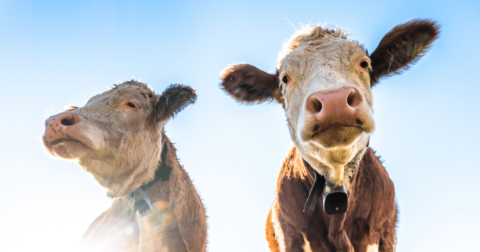Explainer
Are Organized Animal Rebellions Really a Thing?
Animal Behavior•6 min read
Explainer
When it comes to cows’ feelings and preferences, humans can find plenty to relate to.


Words by Seth Millstein
There are around a billion cows on the planet, but most of us know very little about them. Despite the fact that they are ubiquitous, visible and instantly recognizable creatures, most people think of cows primarily as a food source, and avoid relating to them as they would, say, a cat or dog. Contrary to popular belief, however, cows are playful and sensitive animals with distinct personalities, complex emotions and rich social lives. Cows play, form friendships within their herd and lament the loss of their children. In general, cows are far more similar to traditional pets — and ourselves — than is commonly believed.
A personality is a set of traits and tendencies that differs between individuals, but remains consistent within each individual. Anthropologists generally look at five categories when discussing human personalities: Openness, conscientiousness, extroversion, agreeableness and neuroticism.
Scientific literature often uses clinical terms like “temperament” or “behavioral syndromes” to describe cows’ behavior, but this language is misleading; as Lori Marino and Krista Allen point out in their study “The Psychology of Cows,” there is no substantive distinction between those terms and the behaviors that we would call “personality traits” in humans or other species. In fact, many studies have shown that cows, like humans, are individuals with distinct and consistent personalities.
For instance, some cows are more “chill” than others — that is, they have a higher tolerance for potentially stressful stimuli, such as sudden loud noises or having their udders prepared for milking. Cows also vary in how curious and open-minded they are, which is measured by their different reactions to novel objects being placed in their presence, and their general levels of reactivity.
These personality differences are measured, in part, by simply observing different cows’ behavior over time in response to the same stimuli. However, researchers are also able to measure cow’s emotional responses — and thus, their personalities — by observing their eyes. When a cow lifts his or her eyelids, the whites of their eyes become more visible. Multiple studies have found that cows display a higher percentage of eye whiteness when they are fearful or frustrated than when they’re relaxed, happy or content.
Cows engage in many different forms of play, with each other and humans alike. They’ll run around, chase each other and bat around objects like balls. Calves who’ve been housed together will play-fight with one another, which encourages their future success in the herd by promoting assertiveness. Some cows even like to play fetch with humans.
However, all of this is contingent upon a cow’s living situation, and the animal’s wellbeing in general. It’s probably no surprise that cows don’t play as much when they’re miserable; restricting a cow’s access to food, or weaning a calf too early from their mother, will result in less playing. So will physical pain and physical confinement.
Unfortunately, all of these things are common in the cattle industry. Cows on factory farms are crammed into filthy, crowded indoor sheds, with little-to-no access to the outdoors and no opportunity for grazing (let alone playing). Calves are often separated from their mothers and raised in isolation, which results in less play behavior, decreased social competence and lower welfare in general, a 2020 study published in Cambridge University Press found. This is to say nothing of the myriad illnesses, infections and ailments that farmed cattle suffer from due to the poor living conditions, nor the castrations, brandings, dehornings and disbuddings that are standard on factory farms. All of these things are excruciatingly painful for the cattle in question, resulting in more misery and less play.
As herd animals, cows are intensely social creatures. They exhibit both emotional contagion and emotional buffering., Emotional contagion is when the presence of a highly stressed cow stresses out the rest of the herd, while emotional buffering is when a more chilled-out cow has a calming effect on his or her flockmates. This behavior is a testament to the social nature of cows; they rely on one another, physically and psychologically, for survival.
Away from the confines of farming, the process of a cow’s socialization begins as soon as they’re born. If given the chance, mothers will lick their calves for several hours after birth, which is how they form an initial bond with their offspring. Studies have found that a mother cow forms an attachment with her child within five minutes of their birth, and becomes distressed if separated from them. After this initial period of bonding, young calves will seek out companions in their herd, and eventually, form social groups within the herd. These groups promote the cows’ general wellbeing; a 2003 study found that when cows are removed from their group and placed into an unfamiliar one, they exhibit more aggression and distress.
Even within their social groups, cows form individual relationships. A UK study of over 400 cows found that over half of them preferred to hang out with one specific individual — their “best friend,” if you will. Furthermore, cows who were separated from their social group but allowed to stay with their best friend were less distressed than cows who were separated without any of their friends. In a separate study involving Zebu cattle in Kenya, researchers found that some cows only licked their best friend, and maintained these friendships for years.
Licking remains an important part of cows’ social lives long after they’re born. Studies of Austrian Simmental cows found that cows who received licks from others experienced a lowered heart rate, implying that they found the experience relaxing.
Within the restrictive and stressful confines of industrialized farming, however, cows can’t engage in these natural behaviors.
Physically excruciating acts like dehorning and castration, and emotionally damaging events like family separation, are commonplace in the cattle industry. Unsurprisingly, both types of trauma can cause cows to feel sadness and other negative emotions. Cows will maintain a depressed and anxious psychological state for days after such events, remaining emotionally impaired and interpreting neutral or ambiguous stimuli more hesitantly or negatively.
Cows can even cry, in the sense that they can vocalize negative emotion and cry out for help when they’re distressed or in pain. Mother cows do this when their calves are forcibly removed from them on farms, wailing for days on end in hopes that their baby will hear them and cry back in return.
Cows don’t produce tears or water in their eyes as a side effect of emotion; however, their eyes will moisten to resist dryness, and excessive water and overspill may be the result of the many infections cows suffer on industrial farms.
Humanity has contrived a barrier between certain animals that are perceived as companions, and others perceived as mere sources of food. But many animals in the latter category are just as capable of bonding with humans, feeling physical pain and pleasure, and experiencing complex emotions. Cows are no exception to this; they can and will bond with humans, when given the opportunity, and under the right circumstances.
There is plenty of anecdotal evidence of this, from the book “The Secret Life of Cows” to the insights of veterinarians to the writings of cow farmer D. H. Lawrence. And while there have been limited studies of the human-cow relationship, there is some scientific evidence that humans and cows can form positive, productive relationships with one another.
For instance, cows enjoy being petted by humans. One study, cited by Marino and Allen, showed that eye-white percentage decreased in cows after gentle petting by humans, implying increased happiness and relaxation. Another study found that cows elongate their necks, lower their ears and experience a reduction in heart rate when stroked by humans in areas where cattle tend to lick one another.
Human-cow interactions can be mutually-beneficial. Some farms now offer “cow cuddling” sessions to visitors. This practice, which is exactly what it sounds like, started in rural areas of Amsterdam around a decade ago. Studies have shown that simply being around animals can decrease a person’s stress levels, and those who’ve spent a couple of hours snuggling up with a cow will attest to its calming effect.
In addition to all of this, humans can indirectly soothe cows by facilitating their social urges. Cows like to play with certain toys, like balls or hanging ropes or piles of hay or grass to root around in, as these interactions provide mental stimulation. Cows also enjoy mild scents like lavender, as well as the soothing tones of classical music.
By and large, cows are friendly and approachable animals who enjoy positive interactions with humans. People who engage in healthy relationships with cows are rewarded and impressed by their sensitivity, friendliness and intelligence.
Their gentle and kind nature notwithstanding, cows can get irritated just like any other animal. They do not like loud noises, confined spaces or being cornered. They are especially distressed when separated from their herd, social group or their parents or children. Cows are also known to have neophobia, meaning they can be suspicious of new objects introduced into their surroundings.
It’s important to note two things here: first, the aforementioned irritants are generally irritating to all animals, not just cows. Most humans don’t enjoy confined spaces, sudden loud noises or being forcibly separated from their families, either.
More to the point, all of the things that upset cows are standard practices on factory farms. Cattle are crammed into tight spaces, separated from their mothers and forbidden from socializing with their herdmates. Separation from the herd, which occurs in the final moments of a cow’s life, is particularly distressing to both the children and the mother. All of these practices cause suffering among cows — and that’s to say nothing of unbearably painful procedures like castration, disbudding, dehorning and branding, all of which occur on factory farms.
Because of these violent practices, dairy cows’ lifespans have decreased by an average of 35 months since 1960. Mother dairy cows — who only live for about five years nowadays, instead of a natural 20 — are forced to birth a calf every year to maintain their milk production. The trauma of separation is, therefore, an annual ritual.
Cows are curious and intelligent creatures who experience complex emotions, play with each other, have best friends and exhibit acute levels of self-awareness. Their fundamental urges to socialize, enter into relationships, guard their young, stimulate their brains — and, just as importantly, to avoid the pain of the brand, knife and bolt-gun — are relatable, even to us humans.